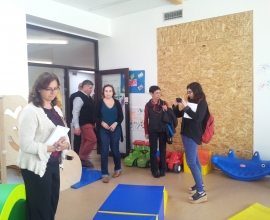Towards quality early childhood day care services in Uruguay
A delegation from Uruguay, led by the National Secretariat of Care of the Ministry of Social Development visits European experiences aimed at establishing quality services for early childhood day care
Uruguay is advancing in the definition of its National Care System, which is considered a priority of the current president. The National Secretariat of Care of the Ministry of Social Development, in collaboration with an inter-agency commission, is designing the System, including the creation of the corresponding inputs to be included in the Budget Law for the coming five-year period. In addition, the law creating the System is being debated in the Parliament (it already has the support of the Senate), and implementation is expected in 2016.
The National Care System aims to design, promote, and implement public policies for attending to the needs of dependent persons, while promoting the highest possible degree of personal autonomy, within the framework of a co-responsibility model between families, the State, the market, and the community. Likewise, the system aims to contribute to overcoming the traditional gender-based division of labour, promoting co-responsibility both in terms of gender and generationally.
In the current design phase of the system, the EU programme EUROsociAL is supporting the National Secretariat of Care in defining quality day care services for early childhood, which will be implemented within the framework of the System. To this purpose, a delegation from Uruguay made a technical visit to study French and Belgian experience. The delegation was comprised of civil servants from Uruguay's Ministry of Social Development, Ministry of Education and Culture, National Administration of Public Education, and Institute for Children and Adolescents.
The delegation met with government institutions in France (the National Family Allowance Fund and the National Family Allowance Fund of Saint Brieuc) and Belgium (City of Ghent), and visited different early childhood day care models in the two countries.
The delegation considered some of the visits as extremely interesting and replicable in the Uruguayan care system. These included before- and after-school day care services, the "maisons d'assistantes maternelles" (a model that brings together four childcare workers to jointly provide child minding services in the same physical space); work based on the concept of slots, adapting the service to the needs of families; shared use of public spaces between various institutions; the centres' furnishings; the information system available to the public which includes geo-referencing of early childhood day care services and reports on the availability of slots and basic information on each service; the integrated supervision system for all day care institutions and services for children between 0 and 3 years of age.
Based on these experiences, the National Secretariat of Care will work on proposals for innovations to be discussed in a workshop with experts in October.
IILA

